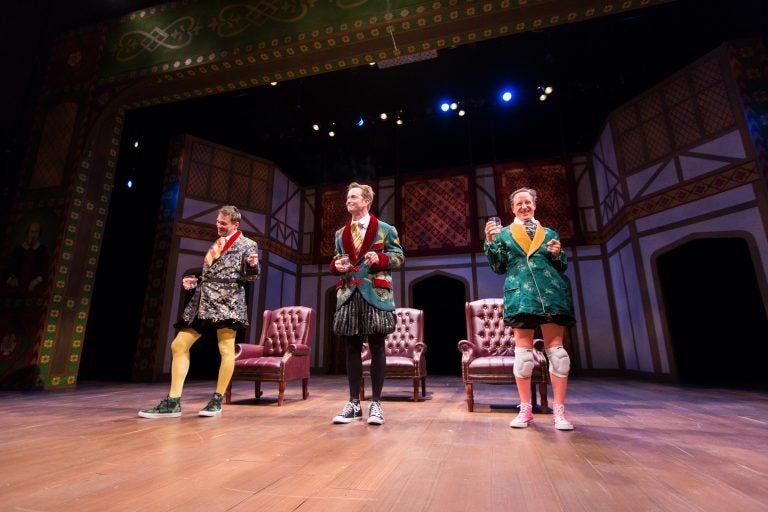A comedic take on Shakespeare’s complete works at Delaware Theatre Company
Need to brush up your Shakespeare?

The Complete Works of William Shakespeare (Photo Courtesy/Delaware Theatre Company)
Need to brush up your Shakespeare?
Head on down to the Delaware Theatre Company where The Complete Works of William Shakespeare (Abridged) (Revised) is offering a madcap review of the Bard’s complete canon through December 23.
The title says it all: 37 plays –plus the sonnets—in 90 minutes. It’s a literary reduction that would make even Reader’s Digest blush. The play is the brainchild of three Americans, Adam Long, Daniel Singer and Jess Winfield, former founding members of the Reduced Shakespeare Company that premiered it thirty years ago at the Edinburgh Festival Fringe. Since then it’s become one of the world’s most popular plays.
The premise is simple: a company of three wants to make Shakespeare more accessible to the masses so they come up with a plan to cram the comedies, tragedies and histories into the time span of one typical performance.
The actors use their real names and play themselves rather than assigned characters. The fourth wall is non-existent: the actors speak directly to the audience and at times bring audience members onstage for certain scenes. It’s also common for the actors to break into scholarly discussions about the significance of a play and to make references to pop culture, current events and local people, places and customs.
The action is hyper-kinetic as the actors run across the stage trying to figure out how they will execute the next play.
The play opens with Actor I (Josh Carpenter) throwing the Cratchit family off the stage (a reference to last season’s production of A Christmas Carol).. He then reminds the audience not to record the show and to turn off cells phones and to those who don’t own a cell phone he thumbs up a “Good for you!”
Actor II (Jeffrey C. Hawkins) then delivers an impassioned speech on how Shakespeare deserves more respect after which Actor III (John Zak) comes down from the audience to read a biography of Shakespeare which somehow morphs into a biography of Adolf Hitler.
They then commence with a parody of Romeo and Juliet which Carpenter clocks at 12 minutes. Too long, he says, they have to hurry. And hurry they do. Titus Andronicus is rendered as a cooking show, while Othello is delivered as a rap song.
All the comedies are rolled into one labyrinthine reading, the justification being that they recycle the same plot devices anyway.
The histories are portrayed as a football game with the British Crown as the pigskin and commentary on each character’s rise and fall from power. Julius Caesar is limited to the death scene. Antony and Cleopatra receives a similar treatment. Macbeth is reduced to a round of golf with truly awful Scottish accents. Coriolanus gets the boot when Hawkins objects to the “vulgar term” in the title.
The actors are ready to wrap things up when they realize that they’ve forgotten to perform Hamlet, the most famous of all the plays. Zak becomes nervous at the thought of performing such a demanding play and runs out of the theater with Hawkins in pursuit. Carpenter copes by stalling then calling for an intermission. After the intermission, Hawkins returns with Zak who has been found at the train station down the street. This saves the audience from having to “read” the 154 sonnets Carpenter has jotted down on a 3” x 5” index card.
The entire second act is a performance of Hamlet. The audience gets involved when two members are brought onstage: one to portray Ophelia during the Nunnery Scene and another to race back and forth as her “ego-on-the run.” The rest of the audience is divided into three sections, each representing her ego, superego and id. After the play is performed, the actors repeat it several times speeding up their delivery. They conclude by performing it backwards.
Carpenter is a masterful Master of Ceremonies as he explains the premise of the show. Equally impressive are his command of improvising and the ease with which he interacts with the audience.
Hawkins is the very essence of a fire-and-brimstone evangelist as he whips up enthusiasm for the Bard.
Zak demonstrates an impressive facility with the language as well as a flair for physical comedy and the wearing of silly wigs.
Barbara Hughes’ take on the poufy shorts and hose worn by men of the era is suitably more comical than historical. Stefanie Hansen’s generic Shakespeare set offers opportunities for Andrew F. Griffith’s evocative lighting. The mano a mano knife and sword fights are perfectly choreographed slapstick. All of these elements come under the deft direction of Steve Tague to create utter chaos … pardon, hilarity.
Cliff Notes should be so entertaining.
WHYY is your source for fact-based, in-depth journalism and information. As a nonprofit organization, we rely on financial support from readers like you. Please give today.




